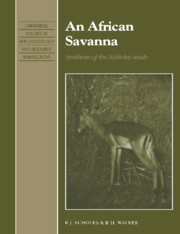Book contents
- Frontmatter
- Contents
- Preface
- I Nylsvley in an African savanna context
- II The key determinants: water, nutrients, fire and herbivory
- III The carbon cycle
- IV Community and landscape pattern and change
- Part V Lessons from Nylsvley
- 16 An overview of savanna ecology
- 17 Managing savannas
- 18 Reflections on ecosystem studies
- Bibliography
- Index
17 - Managing savannas
Published online by Cambridge University Press: 06 October 2009
- Frontmatter
- Contents
- Preface
- I Nylsvley in an African savanna context
- II The key determinants: water, nutrients, fire and herbivory
- III The carbon cycle
- IV Community and landscape pattern and change
- Part V Lessons from Nylsvley
- 16 An overview of savanna ecology
- 17 Managing savannas
- 18 Reflections on ecosystem studies
- Bibliography
- Index
Summary
The Savanna Biome Programme, from its outset, was intended to be strategic research aimed at ultimately improving savanna management. The Department of Agriculture, which has the responsibility for the tactical research needs of the cattle industry, was a prime motivator for the programme. Likewise, the Division of Nature Conservation of the Transvaal Provincial Administration, which is responsible for wildlife on state and private land in the Transvaal, and which owns and manages the Nylsvley study site, actively participated in the research there in the initial phases. These bodies, and the National Parks Board, were represented on the steering committee. Sadly, all of these user-orientated organisations became less involved in the programme with time, and the crucial task of transferring and interpreting the information from the Nylsvley studies into a management framework has occurred largely by chance, if at all.
This chapter aims to give agricultural and conservation extension officers some indication of the practical implications of the basic research carried out in the Savanna Biome Programme. It is their mandate to translate the findings into management practice as implemented by farmers and game rangers. A number of general management-orientated reviews have originated from the Savanna Biome Programme, notably Management of Semi-Arid Ecosystems (Walker 1979), The Management of Large Mammals in African Conservation Areas (Owen-Smith 1983), and Management of semiarid savannas (Barnes 1982). There are many other papers on specific topics which have a management slant, which will be referred to below.
- Type
- Chapter
- Information
- An African SavannaSynthesis of the Nylsvley Study, pp. 261 - 272Publisher: Cambridge University PressPrint publication year: 1993

